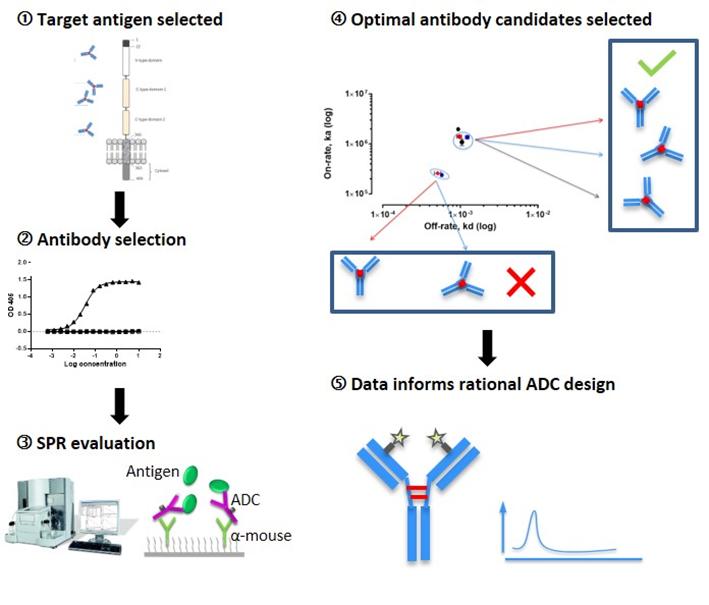Surface Plasmon Resonance (SPR)
Online Inquiry
Surface plasmon resonance (SPR) is a novel method for analyzing biomolecule interactions, with promising applications in antibody drug development, production and quality control. At Creative Proteomics, we have built a cutting-edge SPR platform that offers precise and expedient characterization of antibody drugs. This platform furnishes essential information about antibody drug-binding kinetics, affinity, specificity, and stability that are valuable to professionals in the biotech and pharmaceutical industries.
Principles of Surface Plasmon Resonance
SPR is a biosensing technique that detects biomolecular interactions using traditional optical phenomena. It generates evanescent waves in various media, allowing light to resonate with plasma waves to detect interactions between the ligand and analyte on the biosensing chip. The light source for the SPR biosensor is polarized, and the sensing chip surface is coated with gold film. To conduct the experiment, immobilize the target biomolecule onto the gold film surface and then dissolve the molecule that will interact with it in a flowing solution or mixture over the chip surface. During the binding and dissociation of proteins on the gold membrane chip and molecules within the flow path, the resonance angle (i.e. SPR angle) adjusts accordingly, and the detector captures this change. From there, the data is analyzed to derive intermolecular binding constants Ka, dissociation constants Kd, or affinity constants KD.
 Fig. 1 Surface plasmon resonance as a platform for accelerating effective ADC design and development. (Healey, G. D. et al., 2019)
Fig. 1 Surface plasmon resonance as a platform for accelerating effective ADC design and development. (Healey, G. D. et al., 2019)
Our SPR-Based Antibody Drugs Characterization Services
Creative Proteomics applies surface plasmon resonance technology to our antibody drug characterization service to help our clients gain a comprehensive understanding of their antibody drugs. This technology enables accurate measurements of the interactions between antibodies and their target molecules. Therefore, it offers crucial data for antibody therapeutic candidate development and optimization. Our characterization services enable our clients to make informed decisions in the following drug discovery and development processes:
Evaluation of Immunogenicity of Antibody Drug
Biological drugs are immunogenic and repeated administration can lead to the production of antibodies in both animals and humans. Antidrug antibodies may form a complex with the drug, neutralizing its activity or affecting its normal metabolism. Hence, immunogenicity is a crucial factor in assessing the safety of antibody drugs. Utilizing SPR technology, we can detect the antibodies' immunogenicity accurately, even at low concentrations.
Binding Activity Assay of Antibody Drugs
Activity assay is an important indicator for evaluating the potency of the active ingredient of an antibody drug, mainly assessing the ability of the drug to bind to the target receptor. In addition to ELISA assays, we offer SPR technology to determine the affinity of antibody therapeutics. Our SPR technology can monitor real-time reaction dynamics, providing parameters such as reaction affinity, specificity, and rate.
Host Cell DNA Residues Detection
Residual DNA from passaged cell lines poses potential harm to human health. Therefore, it's necessary to conduct quality control of host cell residual DNA. Our advanced SPR technology can accurately detect residual DNA, eliminating the time-consuming and contamination-prone defects of traditional qPCR technology.
Microbial Contamination Control
Antibody drugs must be strictly controlled to prevent microbial contamination that could pose a safety risk to patients. Our solution is to implement SPR technology for microbial detection, which overcomes the common drawbacks of time-consuming methods and the ease of contamination associated with traditional culture testing.
Advantages of Our Surface Plasmon Resonance Technology
- The analyte to be analyzed does not need to be labeled.
- Real-time dynamic monitoring (i.e., quantification combining affinity, kinetics and thermodynamics).
- High-throughput capability is very sensitive and results are reproducible.
- Measurement of various turn-on rates, turn-off rates and affinities.
- Small amount of sample required to be measured.
- Fast response time.
At Creative Proteomics, we prioritize quality, accuracy, and efficiency. With our SPR technology, we can deliver reliable and precise results in a timely manner, helping our clients to make informed decisions regarding the development and optimization of their antibody-based therapeutics. Contact us to learn more about our service and we will be happy to serve you.
Reference
- Healey, G. D.; et al. A RAGE-targeted antibody-drug conjugate: surface Plasmon resonance as a platform for accelerating effective ADC design and development. Antibodies. 2019, 8(1): 7.

 Fig. 1 Surface plasmon resonance as a platform for accelerating effective ADC design and development. (Healey, G. D. et al., 2019)
Fig. 1 Surface plasmon resonance as a platform for accelerating effective ADC design and development. (Healey, G. D. et al., 2019)